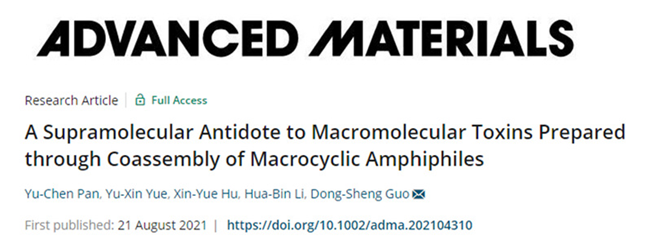Nankai Researchers Make Breakthroughs on Supramolecular Antidotes
Professor Guo Dongsheng's team in College of Chemistry, Nankai University published a paper entitled
“A Supramolecular Antidote to Macromolecular Toxins Prepared through Coassembly of Macrocyclic Amphiphiles” on Advanced Materials recently.
The team has developed melittin antidotes that consist of amphiphilic calixarene (CCA) and amphiphilic cyclodextrin (CD) modified by carboxyl group based on the co-assembly of macrocyclic amphiphiles, which overcomes the limitation of supramolecular detoxification applicability to only small-molecular toxins. Through the hetero-multivalent recognition and strong selective binding of melittin by CCA-CD, various therapeutic effects have been achieved, such as inhibiting the interactions of melittin with cell membranes, alleviating melittin cytotoxicity and hemolytic toxicity, reducing the mortality rate of melittin-poisoned mice, and mitigating damage to major organs.

In recent years, supramolecular detoxification (injecting supramolecular receptors that bind with toxins) has been an emerging strategy for poisoning treatment due to its reduced requirements and a broader application scope. However, challenges of designing the supramolecular materials as an antidote to macromolecular toxins still exists, such as the size, flexible conformation, and presence of multiple and diverse binding sites of biomacromolecules hinder their recognition. Professor Guo’s team has made a breakthrough in dealing with these issues.
Link to the paper: https://onlinelibrary.wiley.com/doi/10.1002/adma.202104310
(Reported by Jiao Jian, edited and translated by Nankai News Team)









